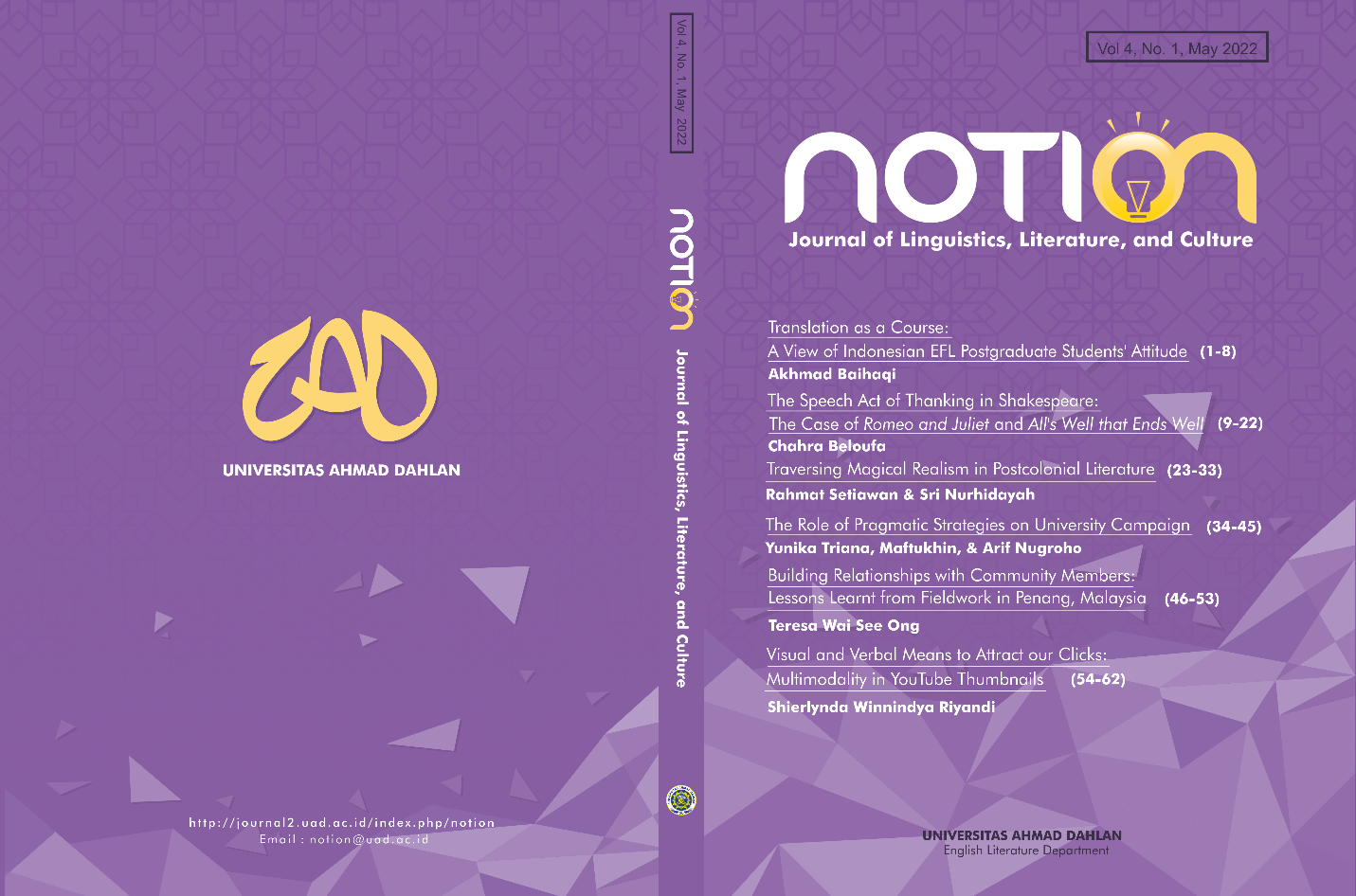Building Relationships with Community Members: Lessons Learnt from Fieldwork in Penang, Malaysia
DOI:
https://doi.org/10.12928/notion.v4i1.5812Keywords:
Building Relationships , Insider/Outsider , Small Talks , Flexibility , Code-switching , Giving BackAbstract
As the world is rapidly chasing processes of modernisation and globalisation, many ethnic communities are perceiving global languages, such as English and Mandarin, as the language-in-demand for academic and economic purposes. This situation leads to young people shifting away from heritage languages, and as a result, heritage languages are disappearing at an alarming rate. Similar situation is taking place in Malaysia, which leads me to conduct a study examining the efforts to maintain Chinese heritage languages in Penang. Data are collected via interviews conducted with 46 participants representing three categories of macro, meso, and micro levels within the Chinese community in Penang. In this article, my goal is to share some lessons learnt from the fieldwork. Specifically, I focus on unpacking three approaches to building relationships with members of the Chinese community. They are holding small talks, being flexible to code-switching, and giving back to the community. Resulting from such relationships is that the Chinese community in Penang become more aware of heritage language maintenance.
References
Blommaert, J., & Jie, D. (2010). Ethnographic fieldwork: A beginner’s guide. Multilingual Matters.
Briggs, C. L. (1986). Learning how to ask: A sociolinguistic appraisal of the role of the interview in social science research. Cambridge University Press.
Canagarajah, S., & Gao, X. (2019). Taking translingual scholarship farther. English Teaching & Learning, 43, p. 1-3. https://doi.org/10.1007/s42321-019-00023-4
Department of Statistics. 2020. Population statistics. www.dosm.gov.my/v1/index.php?r=column/cthree&menu_id=UmtzQ1pKZHBjY1hVZE95R3RnR0Y4QT09
Gibson, C. (2006). Decolonising the production of geographical knowledges? Reflections on research with indigenous musicians”. Geografiska Annaler: Series B, Human Geography, 88(3), p. 277-284. https://doi.org/10.1111/j.1468-0459.2006.00221.x
Giwa, A. (2015). Insider/outsider issues for development researchers from the global south. Geography Compass, 9(6), p. 316-326. https://doi.org/10.1111/gec3.12219
Hajek, J. (2016). Engaging with communities and languages in multilingual urban settings. In K. Taylor-Leech & D. Starks (Eds.), Doing research within communities: Stories and lessons from language and education field research (pp. 124-132). Routledge.
Lamont, M., & Swidler, A. (2014). Methodological pluralism and the possibilities and limits of interviewing. Qualitative Sociology, 37, p. 153-171. https://scholar.harvard.edu/files/lamont/files/art3a10.10072fs11133-014-9274-z.pdf
Lorde, A. (1984). Sister outsider: Essays & speeches. The Crossing Press Feminist Series.
Low, H. M., Nicholas, H., & Wales, R. (2010). A sociolinguistic profile of 100 mothers from middle to upper-middle socio-economic backgrounds in Penang-Chinese community: What languages do they speak at home with their children? Journal of Multilingual and Multicultural Development, 31(6), p. 569-584. https://doi.org/10.1080/01434632.2010.527342
Mushin, I., & Gadner, R. (2016). Establishing connections: A tale of two communities. In K. Taylor-Leech & D. Starks (Eds.), Doing research within communities: Stories and lessons from language and education field research (pp. 105-114). Routledge.
Olko, J., & Sallabank, J. (Eds). (2021). Revitalizing endangered languages: A practical guide. Cambridge University Press.
Ong, T. W. S. (2018). Language maintenance in Malaysia: A case study of the Chinese community in Penang (Unpublished PhD thesis). Griffith University, Australia.
Ong, T. W. S. (2020). Why bother maintaining languages? A discussion based on diminishing Chinese dialects in Malaysia. Apples – Journal of Applied Language Studies, 14(1), p. 1-5. https://doi.org/10.17011/apples/urn.202001171301
Ong, T. W. S. (2021). Family language policy, language maintenance and language shift: Perspectives from ethnic Chinese single mothers in Malaysia. Issues in Language Studies, 10(1), p. 59-75. https://doi.org/10.33736/ils.3075.2021
Ong, T. W. S., & Ben-Said, S. (Forthcoming). Language maintenance and the transmission of ideologies among Chinese-Malaysian families. In S. Makoni, A. Kaiper, & L. Mokwena (Eds.), The Routledge handbook of language and the Global South/s. Taylor & Francis.
Ong, T. W. S., & Troyer, R. A. (Forthcoming). The double-edged sword of Mandarin Chinese: Language shift and cultural maintenance among middle-aged Chinese Malaysians. Manusya: Journal of Humanities, 25(2).
Ooi, K. J. (2015). Disparate identities: Penang from a historical perspective, 1780-1941. Kajian Malaysia, 33(2), p. 27-52. http://web.usm.my/km/33(Supp.2)2015/km33s22015_03.pdf
[Taylor-Leech, K., & Bonn, D. (2016). Navigating the multilingual field: Language choice and sociolinguistic fieldwork”. In K. Taylor-Leech & D. Starks (Eds.), Doing research within communities: Stories and lessons from language and education field research (pp. 66-75). Routledge.
Ting, S.-H., & Mahadhir, M. (2009). Towards homogeneity in home languages: Malay, Chinese Foochow and Indian Tamil families in Kuching, Sawarak, Malaysia. Australian Review of Applied Linguistics, 32(2), p. 11.1-11.22. https://benjamins.com/catalog/aral0911
Wang, X. M. (2014). Chinese education in Malaysia: Past and present. In X. L. Curdt-Christiansen & A. Hancock (Eds.), Learning Chinese in diasporic communities: Many pathways to being Chinese (pp. 139-157). John Benjamins.
Wang, X. M. (2016). Language maintenance or language shift? The role of religion in a Hakka Catholic community in Malaysia. International Multilingual Research Journal, 10(4), p. 273-288. https://doi.org/10.1080/19313152.2016.1192850
Vollman, R., & Soon, T. W. (2018). Chinese identities in multilingual Malaysia. Grazer Linguistische Studien, 89, p. 35-61. https://doi.org/10.25364/04.45:2018.89.3
Downloads
Published
Issue
Section
License
Copyright (c) 2022 Teresa Ong

This work is licensed under a Creative Commons Attribution 4.0 International License.
Authors who publish their articles in NOTION: journal of Linguistics, Literature, and Culture agree to the following terms:
- Authors retain the copyright and grant the journal right of first publication with the work simultaneously licensed under a Creative Commons Attribution 4.0 International License that allows others to share the work with an acknowledgement of the work's authorship and initial publication in this journal.
- Authors are able to enter into separate, additional contractual arrangements for the non-exclusive distribution of the journal's published version of the work (e.g., post it to an institutional repository or publish it in a book), with an acknowledgement of its initial publication in this journal.
- Authors are permitted and encouraged to post their work online (e.g., in institutional repositories or on their website) prior to and during the submission process, as it can lead to productive exchanges, as well as earlier and greater citation of published work.





